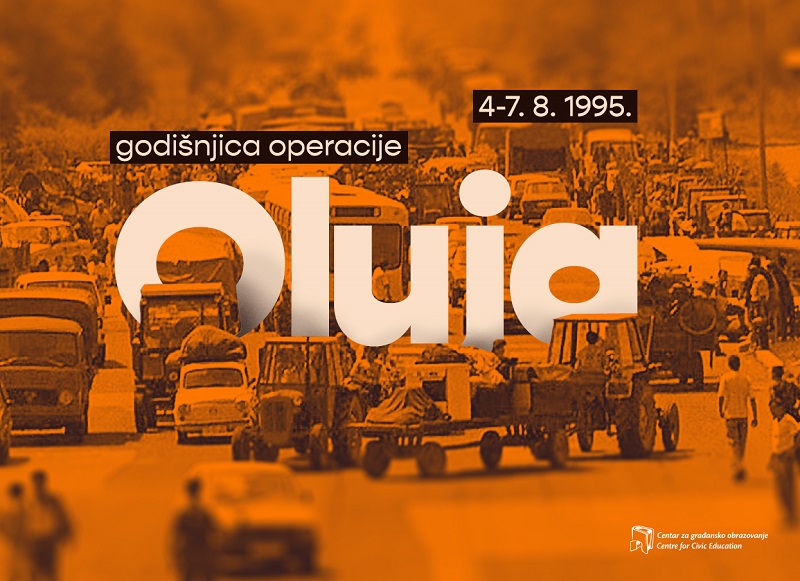Centre for Civic Education (CCE) commemorates innocent victims of crimes that happened during the operation “Storm“, which lasted from 4 to 7 August 1995, and uses the opportunity to reiterate its call on all authorities in the region to effectively deal with the past.
We remind that 26 years ago, with the attack on Knin, at dawn on 4 August 1995, the long-prepared exodus of Serbs from Krajina began. In the military-police operation “Storm”, conducted by the Croatian units, systematic crimes were committed against Serb civilians and their property. For a few days, about 250,000 people were expelled, mainly to Bosnia and Herzegovina, Serbia and other countries of the former Yugoslavia, and thousands of houses and other buildings were burned. Even today, a large number of refugees are waiting to return to the areas from which they were expelled. According to data of the Croatian Helsinki Committee for Human Rights, by the end of 1995, about 400 Serbs who chose to stay in their homes were killed.
The CCE points out that the operation “Storm“ represents one of the most brutal and largest ethnic cleansings in the territory of the former Yugoslavia in the conflicts of the 1990s, and at the same time, it is a crime for which none has been held accountable to date. In 2008, the International Criminal Tribunal for the former Yugoslavia (ICTY) convicted General Ante Gotovina (Commander of the Croatian Armed Forces Split and Chief Operational Commander of Operation Storm in the southern part of Krajina) for crimes against the Serb population in “Storm” then Ivan Čermak, Commander of the Knin Corps and Mladen Markač (Commander of the Special Police of the Ministry of the Interior of the Republic of Croatia. The first-instance verdict from 2011 sentenced Gotovina and Markac to 24 and 18 years in prison for war crimes and crimes against humanity, while Cermak was acquitted, and after an appeal, the following year, Gotovina and Markac were acquitted too. This verdict has caused a great deal of controversy as the ICTY Trial and Appeals Chamber – based on the same facts and the same right – have reached opposed conclusions on key issues disputed by the prosecution and the defence at trial. However, it is important to emphasize that these conclusions do not call into question the facts about what happened during and after Operation „Storm”.
Victims, survivors and families of murdered and missing ones during the ‘’Storm“ are invisible victims for institutions of all countries in the region. Whether they live in Croatia, Serbia or Montenegro today, they do not have any financial, health or psycho-social institutional support. In March 2020, the Law on the Rights of War Veterans, Army Invalids, Civilian Invalids of the War and Members of their Families was passed in Serbia, but even in it, the victims of the operation ‘’Storms“ are not recognized as civil invalids of the war.
During this week of marking the 26th anniversary of the “Storm”, CCE will participate in the regional online campaign organized by the SENSE – Center for Transitional Justice. The campaign is composed of five narratives – The goal of the operation “Storm”; Purpose of shelling; Murders; Destruction and plunder of property; Preventing of return. As of today, all materials will be published on social media by the CCE, SENSE and partners.
Tamara Milaš, Human Rights Programme Coordinator

